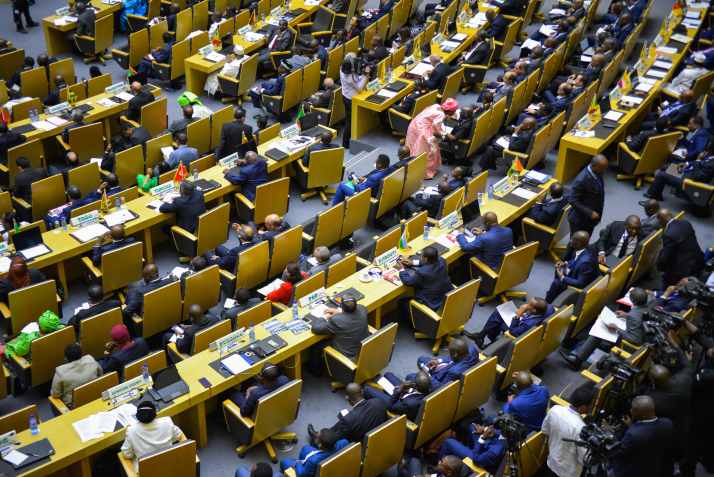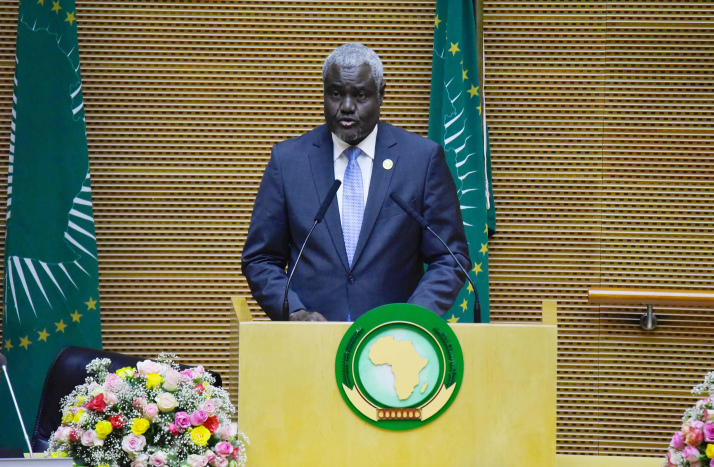|
||||||||||
| Home Nation World Business Opinion Lifestyle ChinAfrica Multimedia Columnists Documents Special Reports |
|
||||||||||
| Home Nation World Business Opinion Lifestyle ChinAfrica Multimedia Columnists Documents Special Reports |
| ChinAfrica |
| Silencing the Guns |
| The African Union's silencing guns initiative is vital for Africa's development |
| By Benard Ayieko | VOL.12 March ·2020-03-12 |

The 33rd African Union Summit is held from January 21 to February 10 in Addis Ababa, Ethiopia (XINHUA)
Newly elected Chairperson of the African Union (AU), South African President Cyril Ramaphosa outlined key priority areas that will drive Africa's growth within the framework of Agenda 2063, while addressing the 33rd Ordinary Session of the Assembly of Heads of State and Government of the AU.
Speaking at the AU headquarters in Addis Ababa, Ethiopia on February 9, Ramaphosa focused, among others, on deepening unity in Africa, economic and financial inclusion for women and mainstreaming the interests of women, conflict resolution and championing the position of Africa as a strong and influential player in the global arena.
What stood out was the unprecedented attention on "conflict resolution" that resonated with this year's theme "Silencing the Guns: Creating Conducive Conditions for Africa's Development." Ramaphosa noted that Africa must take charge of its peace and security agenda by finding solutions to African problems. He underscored the need to urgently deal with the action of countries outside the African continent that are fighting proxy wars and fueling existing conflicts in Africa.
Addressing the session on the implementation of the flagship project on silencing the guns, Ambassador Ramtane Lamamra, AU High Representative for Silencing the Guns, said, "Looking at the achievements made in promoting peace and security on the continent in recent decades, particularly since 2004, with the operationalization of the AU Peace and Security Council, the noble objective of silencing the guns and ending wars on the continent is achievable."
Peace efforts
Peace and stability have been elusive in Africa, yet these are key ingredients for socio-economic development. When there is peaceful coexistence between citizens and nations, the opportunities for social, cultural and economic interaction and integration increase immensely. Sadly, nowhere in the world has conflicts between citizens or nations been as frequent or as violent over the past half a century as in Africa.
There has been remarkable progress in dealing with the scourge of violent conflicts since the 50th Solemn Declaration was adopted by the 21st Ordinary Session of the AU Assembly of Heads of State and Government on May 26, 2013 in Addis Ababa. Since 2014, efforts to achieve peace and security in Africa by strengthening conflict resolution mechanisms, a rapid response framework and institutions through bilateral and multilateral engagements in conflict zones have increased. The last two decades have witnessed silenced guns in areas which were initially regarded as hotspots like Angola, Côte d'Ivoire, Liberia and Sierra Leone.
Somalia, Sudan and South Sudan, previously seen as bedrocks of violent conflicts, have equally made significant strides in efforts to find a lasting solution. Prior to the official opening of the session, Ramaphosa met separately with South Sudanese President Salva Kiir and the former Vice President Riek Machar, in an effort to kick start mediation efforts aimed at forming a power-sharing government as part of the AU's efforts to silence guns in South Sudan. On ending the conflict in Libya, the AU's involvement has been visible with consistent calls for the need of broader participation of African nations in finding a lasting solution under the stewardship of the United Nations.
Speaking at the same venue, UN Secretary General Antonio Guterres reiterated on the significance of a process that includes women and youth in Africa's peace initiatives. Guterres commended the One Million by 2021 Initiative, spearheaded by the AU whose objective is to reach out to a million youth in Africa with opportunities, and stressed the UN's unwavering support in silencing guns in Africa. These are part of the AU's peace building initiatives aimed at quelling many potential flare-ups in Africa.

African Union Commission Chairperson Moussa Faki gives a speech at the assembly of Heads of State and Government of the African Union in Addis Ababa, Ethiopia, on February 9 (XINHUA)
Silencing guns and virus prevention
Even though remarkable progress has been made in silencing the guns, the journey has encountered its fair share of bottlenecks which have neutered, slowed or prevented silencing of guns. Some of the challenges include AU's lack of institutional reforms and a clear roadmap on silencing guns that guides the attainment of a peaceful and prosperous continent.
There are also threats from terrorism and transnational crime, communal conflicts over resources, violent crime, illegal trafficking of guns and cultural practices. Despite the challenges, there is no option to silencing the guns – the violent conflict adversely affects the continent's economic progress and costs billions of dollars.
Sadly, the cost of "noisy" guns in Africa is staggering. A study by World Bank on the Economic Cost of Conflict estimates that violent conflict adversely affects a country's economic progress through loss of between 2 percent to 8.4 percent in annual gross GDP growth. The report further stated that countries that border conflict zones also suffer 1.4 percent decline in annual GDP and 1.7 percent rise in inflation. In addition, prevention of conflicts on the continent is a cost-effective measure that, besides saving millions of lives, is economically beneficial to countries as by averting conflicts; a cost saving of $5 billion to $70 billion per year is realized. This is money that would be plowed back into the economy to build infrastructure, create jobs and fight poverty.
Besides discussing the issue of silencing guns, AU members took time to delve into ways and means of dealing with the spread of the COVID-19 virus – a disease that surfaced in Wuhan, China and continues to cause many deaths, fear and human suffering in that country and worldwide.
Weeks ago, the World Health Organization (WHO) declared the COVID-19 virus outbreak a public health emergency of international concern, majorly because of fears that developing countries would be hardest hit by the outbreak. In Africa, countries like Kenya, Ethiopia, Côte d'Ivoire, Ghana and Botswana have dealt with possible cases, with suspected patients being quarantined, while tests are done. Fortunately, at the time of writing, all the tests have so far in Africa have been negative for the virus. The Africa Centers for Disease Control and Prevention has activated its emergency operations center and engaged its Incident Management System for the outbreak, recommending that all member states should enhance their surveillance of the virus.
Member states are also encouraged to receive direct or connecting flights from China, but should intensify screening of incoming passengers for severe respiratory illness and it is felt that this virus will in no way impact growing Sino-African relations.
(The writer is an economist, consultant and a regional commentator based in Nairobi, Kenya)
(Comments to zanjifang@chinafrica.cn)
| About Us | Contact Us | Advertise with Us | Subscribe |
| Copyright Beijing Review All rights reserved 京ICP备08005356号-5 京公网安备110102005860号 |